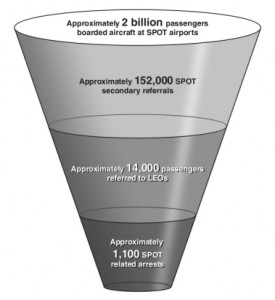Lawsuit seeks suspension of TSA virtual strip-searches
Last year the Identity Project was one of more than 30 organizations that filed a joint petition with the DHS requesting a formal rulemaking on use of virtual strip-search machines or “body scanners”, then being referred to by DHS and TSA as “whole body imaging” machines and since re-euphemized as “advanced imaging technology”, as though the name itself could make them inherently more “advanced”.
In May of this year, after the DHS ignored our petition and moved forward with deployment of virtual strip-search machines without a formal rulemaking, we joined most of the same groups in filing a renewed petition for a formal rulemaking (including an opportunity for public comment) and for rescinsion of the rules requring submission to a virtual strip-search as a condition of passage through TSA checkpoints and travel by air common carrier. We also filed a series of FOIA requests and appeals, which the TSA has to date ignored, for the TSA Standard Operating Procedures, screening-related directives to airlines, and other documents embodying the secret rules that include the virtual strip-search requirements. We’ve also speculated about what legal recourse travelers denied passage on the basis of refusal to submit to a virtual strip-search might have, particularly in jurisdictions abroad where it would be easier than it is in the USA to raise issues of international human rights law.
This past Friday, July 2nd, the Electronic Privacy Information Center (EPIC) filed a federal lawsuit seeking to have the Court of Appeals for the District of Columbia review the TSA and DHS failure to conduct a formal rulemaking before deploying virtual strip-search machines and issue an emergency stay of the TSA/DHS decision to deploy and require them as a condition of passage through checkpoints and air travel.
The Identity Project was a party to the original petitions for rulemaking, and while we aren’t a party to the EPIC lawsuit, we fully support it.
As EPIC notes in its latest filings, even after September 11th Federal courts have upheld “administrative (warrantless, suspicionless) searches in airports only to the extent that they are limited to what is “necessary” — meaning that they are actually effective and are the least restrictive available means — to detect weapons and explosives. Even beyond the specific issue of virtual strip-searches, this lawsuit is likely to be significant in helping define the bounds of TSA authority to conduct ever more intrusive searches as a condition of common-carrier travel.
The petition filed in May by EPIC, the Identity project, and others stated that, “The undersigned file this petition pursuant to 5 U.S.C. § 553(e), which requires that ‘[e]ach agency shall give an interested person the right to petition for the issuance, amendment, or repeal of a rule.'” Notwithstanding this explicit statement, the DHS and TSA responded with the bizarre claim that, for unspecified reasons, it did not constitute such a petition. Unfortunately, that’s characteristic of the behavior of the DHS and TSA, which have repeatedly refused to acknowledge or docket our formal complaints and then falsely claimed, including to the US public and to foreign governments that they have received no such complaints.
